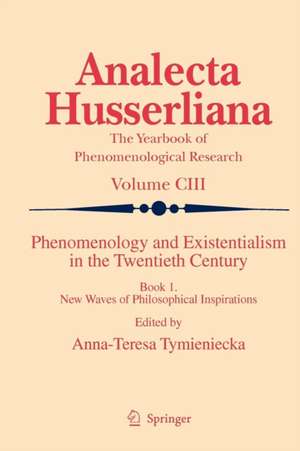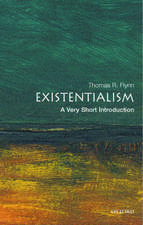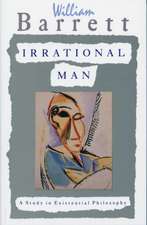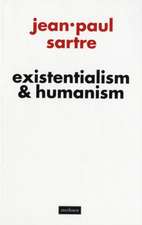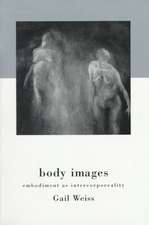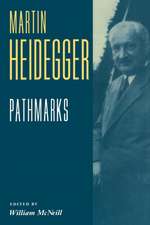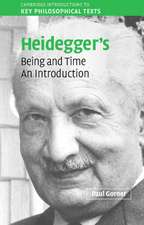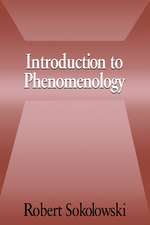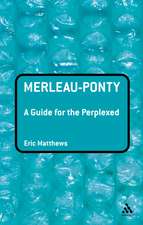Phenomenology and Existentialism in the Twentieth Century: Book I. New Waves of Philosophical Inspirations: Analecta Husserliana, cartea 103
Editat de Anna-Teresa Tymienieckaen Limba Engleză Paperback – 14 mar 2012
Among the leading Husserlian insights are treated essence and experience, the place of questioning, ethics and intentionality, temporality and passivity and the life world.
The following book will uncover the perennial concerns guiding the wondrous interplay of these two inspirational sources.
| Toate formatele și edițiile | Preț | Express |
|---|---|---|
| Paperback (2) | 952.57 lei 43-57 zile | |
| SPRINGER NETHERLANDS – 14 mar 2012 | 952.57 lei 43-57 zile | |
| SPRINGER NETHERLANDS – 14 mar 2012 | 1824.01 lei 43-57 zile | |
| Hardback (2) | 958.73 lei 43-57 zile | |
| SPRINGER NETHERLANDS – 28 sep 2009 | 958.73 lei 43-57 zile | |
| SPRINGER NETHERLANDS – 5 noi 2009 | 1830.34 lei 43-57 zile |
Din seria Analecta Husserliana
- 17%
 Preț: 524.10 lei
Preț: 524.10 lei - 24%
 Preț: 814.98 lei
Preț: 814.98 lei - 20%
 Preț: 570.72 lei
Preț: 570.72 lei - 15%
 Preț: 643.00 lei
Preț: 643.00 lei - 18%
 Preț: 2098.96 lei
Preț: 2098.96 lei - 15%
 Preț: 636.12 lei
Preț: 636.12 lei - 15%
 Preț: 643.84 lei
Preț: 643.84 lei - 18%
 Preț: 1222.01 lei
Preț: 1222.01 lei - 18%
 Preț: 950.52 lei
Preț: 950.52 lei - 15%
 Preț: 642.18 lei
Preț: 642.18 lei - 24%
 Preț: 1072.12 lei
Preț: 1072.12 lei - 18%
 Preț: 947.67 lei
Preț: 947.67 lei - 18%
 Preț: 1225.94 lei
Preț: 1225.94 lei - 24%
 Preț: 1075.48 lei
Preț: 1075.48 lei - 18%
 Preț: 949.73 lei
Preț: 949.73 lei - 15%
 Preț: 647.59 lei
Preț: 647.59 lei - 20%
 Preț: 577.73 lei
Preț: 577.73 lei -
 Preț: 386.22 lei
Preț: 386.22 lei - 15%
 Preț: 651.19 lei
Preț: 651.19 lei - 18%
 Preț: 960.42 lei
Preț: 960.42 lei -
 Preț: 390.08 lei
Preț: 390.08 lei - 18%
 Preț: 1128.89 lei
Preț: 1128.89 lei
Preț: 952.57 lei
Preț vechi: 1161.67 lei
-18% Nou
Puncte Express: 1429
Preț estimativ în valută:
182.28€ • 190.79$ • 151.71£
182.28€ • 190.79$ • 151.71£
Carte tipărită la comandă
Livrare economică 31 martie-14 aprilie
Preluare comenzi: 021 569.72.76
Specificații
ISBN-13: 9789400730458
ISBN-10: 9400730454
Pagini: 468
Ilustrații: X, 456 p.
Dimensiuni: 152 x 223 x 25 mm
Greutate: 0.65 kg
Ediția:2009
Editura: SPRINGER NETHERLANDS
Colecția Springer
Seria Analecta Husserliana
Locul publicării:Dordrecht, Netherlands
ISBN-10: 9400730454
Pagini: 468
Ilustrații: X, 456 p.
Dimensiuni: 152 x 223 x 25 mm
Greutate: 0.65 kg
Ediția:2009
Editura: SPRINGER NETHERLANDS
Colecția Springer
Seria Analecta Husserliana
Locul publicării:Dordrecht, Netherlands
Public țintă
ResearchCuprins
Theme.- Theme.- Section I.- Husserl and Phenomenology, Experience and Essence.- Jean Wahl the Precursor: Kierkegaard and Existentialism.- The Transcendental and the Singular: Husserl and the Existential Thinkers Between the Two World Wars.- DE L’ « In-Existence » Intentionnelle À ? « Ek-In-Sistence » Existentielle.- The Value of the Question in Husserl’s Perspective.- Section II.- The Essential Structure and Intentional Object of Action: Toward Understanding the Blondelian Existential Phenomenology.- Subjectivity, Openness and Plurality: on the Background of Edmund Husserl’s Phenomenological Reduction.- What Does it Mean to be an Existentialist Today?.- Dufrenne and Merleau-Ponty: A Comparative Meditation on Phenomenology.- The Ethical Project and Intentionality in Edmund Husserl.- Is Nietzsche a Phenomenologist?—Towards a Nietzschean Phenomenology of the Body.- The Problem of Authenticity and Everydayness in Existential Philosophy.- Section III.- Lev Shestov’s Philosophy of Crisis.- The Idea of God-Man in Nicolas Berdyaev’s Existentialism.- Unamuno as “Pathological” Phenomenologist: Tragic Sense and Beyond.- Blondel and the Philosophy of Life.- Section IV.- From the Archeology of Happening … to the Matter of Death.- The Phenomenology of Pain: An Experience of Life.- The Existential Overcoming of Phenomenology in Hans Blumenberg’s Philosophy of Life and Myth.- Section V.- Temporality and Passivity in Edmund Husserl’s Analyses.- On Existence, Actuality and Possibility.- The Consciousness of Time in Life Through Phenomenology and Existentialism.- Section VI.- Existentialism: An Atheistic or A Christian Philosophy?.- The Horizon of Humanity and the Transcendental Analysis of the Lifeworld.- Crisis and Culture.- Section VII.- Understanding asBeing: Heidegger and Mamardashvili.- Mind – Its Way of Existence, Structure and Functions in Tibetan Buddhism – Comparison with Phenomenology.
Caracteristici
This volume is devoted to phenomenology and existentialism and to their interaction Illustrates how phenomenology and existentialism transformed human understanding and experience of the twentieth century Gives insight in the relation between existentialism and Christian faith and atheism
Textul de pe ultima copertă
Our world’s cultural circles are permeated by the philosophical influences of phenomenology and existentialism and the illuminations of movements following on them. These two quests to elucidate rationality – ever renewed in the progress of thought – took their distinct inspirations from Kierkegaard’s existentialism plumbing the subterranean source of subjective experience and Husserl’s phenomenology focusing on the constitutive aspect of rationality. From a century’s distance, however, we can see that those who continued Husserl’s investigations and the existentialists could meet and mingle readily because they had this in common, the vindication of full reality.
The two projects melded in the inquisitive minds (Scheler, Heidegger, Sartre, Stein, Merleau-Ponty, et al.) and numerous philosophical issues were expanded in various perspectives (the lived body, subjectivity, personhood, etc.) In a fruitful cross-pollination of insights, ideas, approaches, fused in one powerful wave and undermined the dominant reductionism, empiricism, naturalism then being disseminated throughout science and all domains of thought.
Existentialist rejection of ratiocination and speculation together with Husserl’s shift to seeking the genesis of meaning in experience closed a gap between philosophy and literature (Wahl, Marcel, Berdyaev, Wojtyla, Tischner, etc.), the foundational nature of language (Wittgenstein, Derrida, etc.) and opened the "hidden" behind the "veils" (see herein Sezgin and Dominguez-Rey).
This wondrous renewing wind had not only transformed the culture of our day, but has also paved the way to the renewal of our humanity in a New Enlightenment, to which we will pass in our following third and final volume in which we appreciate the impact and promise of Phenomenology and Existentialism in the twentieth century.
The two projects melded in the inquisitive minds (Scheler, Heidegger, Sartre, Stein, Merleau-Ponty, et al.) and numerous philosophical issues were expanded in various perspectives (the lived body, subjectivity, personhood, etc.) In a fruitful cross-pollination of insights, ideas, approaches, fused in one powerful wave and undermined the dominant reductionism, empiricism, naturalism then being disseminated throughout science and all domains of thought.
Existentialist rejection of ratiocination and speculation together with Husserl’s shift to seeking the genesis of meaning in experience closed a gap between philosophy and literature (Wahl, Marcel, Berdyaev, Wojtyla, Tischner, etc.), the foundational nature of language (Wittgenstein, Derrida, etc.) and opened the "hidden" behind the "veils" (see herein Sezgin and Dominguez-Rey).
This wondrous renewing wind had not only transformed the culture of our day, but has also paved the way to the renewal of our humanity in a New Enlightenment, to which we will pass in our following third and final volume in which we appreciate the impact and promise of Phenomenology and Existentialism in the twentieth century.
